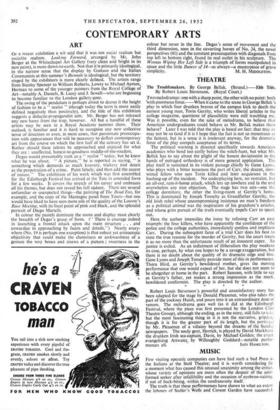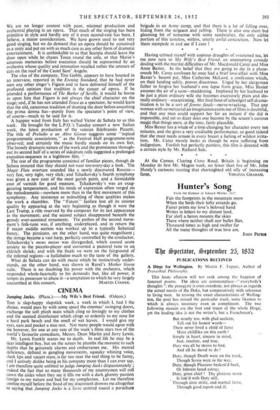MUSIC
FEW visiting operatic companies can have had such a bad Press as the Italians at the Stoll Theatre; and it is worth considering for a moment what has caused this unusual unanimity among the critics, whose variety of opinions are more often the despair of the unin- formed seeker after infallibility and the occasion of eyebrow-raising. if not of back-biting, within the confraternity itself. The truth is that these performances have shown to what an extent the labours of Sadler's Wells and Covent Garden have succeeded. We are no longer content with poor, minimal production and orchestral playing in an opera. That much of the singing has been primitive in style and hardly any of it even second-rate has been, I believe, a minor consideration. We have grown used to not very good singing, but we do demand that an opera should be conceived as a unity and put on with as much care as any other form of dramatic entertainment. It is unthinkable to us that Scarpia should leave the door open while he chases Tosca round the sofa, or that Mario's amorous memories before execution should be represented by an orchestra whose quality and intonation recalled rather the amours of cats on the roof of the Castel Sant' Angelo.
The &a of the company, Tito Gobbi, appears to have boasted in an interview, reported in the Evening Standard, that he had never seen any other singer's Figaro and to have delivered himself of the profound opinion that tradition is the cancer of opera. If he attended a performance of The Barber of Seville, it would be borne in upon him that Figaro is not always the chief character on the stage; and, if he has not attended Tosca as a spectator, he would learn that the old, cancerous tradition of shutting the door before assaulting the prima donna has—purely from the spectator's point of view, of course—much to be said for it.
A happier wind from Italy has wafted Victor de Sabata to us this week. He brought for the L.P.O.'s Tuesday concert a new Italian work, the latest production of the veteran Ildebrando Pizzetti. The title of Preludio a un Altro Giorno suggests some "topical programmatic associations," as the Festival Hall programme-note observed; and certainly the music hardly stands on its own feet. The loosely dramatic nature of the work and the prominence through- out its second half of a series of sidedrum rolls suggested a prolonged execution-sequence in a highbrow film. ".
The rest of the programme consisted of familiar pieces, though de Sabata ensured that they should not wear too every-day a look. The Magic Flute overture sounded like a newly discovered Rossini—. very fast, very tight, very slick; and Tchaikovsky's fourth symphony was given a new coat of the most garish paint, and a formidable coat of varnish for good measure. Tchaikovsky's was an exag- gerating temperament, and his mode of expression often verged on the melodramatic—nowhere more than in the first movement of this symphony. Any insistence or redoubling of these qualities makes the work a shambles. The "Fatum" fanfare lost all its sinister quality by appearing at the very beginning as though it were the Last Trump, a role reserved by the composer for its last appearance in the movement; and the second subject disappeared beneath the grossly over-accented ornaments. The pathos of the second move- ment's folk-tune was, if anything, underplayed, and in return the F major middle section was worked up to a typically Sabatical frenzy. The pizzicato, on the other hand, was quite magnificent ; the strings became a vast harp, perfectly controlled by the conductor. Tchaikovsky's meno mosso was disregarded, which caused acute anxiety to the piccolo-player and converted a pastoral tune to an eldritch shriek; and with the finale we were on the fairground of the infernal regions—a hullabaloo much to the taste of the gallery.
What de Sabata can do with music which he instinctively under- stands, on the other hand, was shown in Ravel's Mother Goose suite. There is no doubting his power with the orchestra, which responded whole-heartedly to his demands; but, like all power, it tempts its possessor to abuse it—a temptation to which he very largely



































 Previous page
Previous page